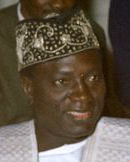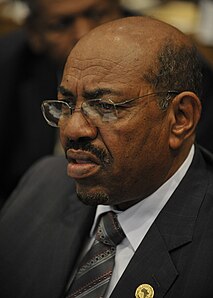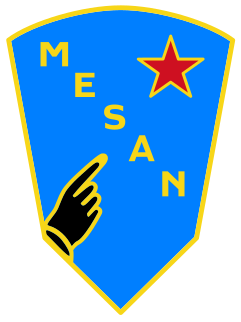
Modibo Keïta was the first President of Mali (1960–1968) and the Prime Minister of the Mali Federation. He espoused a form of African socialism.

The Alliance for Democracy and Federation–African Democratic Rally is a liberal political alliance in Burkina Faso, consisting of the Alliance for Democracy and Federation and the former ruling party African Democratic Rally.
The Rassemblement Démocratique Africain, commonly known as the RDA and variously translated as African Democratic Assembly and African Democratic Rally, was a political party in French West Africa and French Equatorial Africa which was important in the decolonization of the French empire. The RDA was composed of different political parties throughout the French colonies in Africa and lasted from 1946 until 1958. At certain points, the RDA was the largest political party in the colonies in Africa and played a key role in the French government headed by the Democratic and Socialist Union of the Resistance (UDSR). Although the regional party largely dissolved in 1958 with the independence votes for the colonies, many of the national parties retained the RDA in their name and some continue to do so. The political ideology of the party did not endorse outright secession of colonies from France, but it was anti-colonial and pan-Africanist in its political stances.

The Mali Federation was a federation in West Africa linking the French colonies of Senegal and the Sudanese Republic for a period of only two months in 1960. It was founded on 4 April 1959 as a territory with self-rule within the French Community and became independent after negotiations with France on 20 June 1960. Two months later, on 19 August 1960, the Sudanese Republic leaders in the Mali Federation mobilized the army and Senegal leaders in the federation retaliated by mobilizing the gendarmerie which resulted in a tense stand-off and the withdrawal from the federation by Senegal the next day. The Sudanese Republic officials resisted this dissolution, cut off diplomatic relations with Senegal, and defiantly changed the name of their country to Mali. For the brief existence of the Mali Federation, the premier was Modibo Keïta, who would become the first President of the Republic of Mali after the Mali Federation dissolved, and its government was based in Dakar, Senegal.

The Sudanese Regroupment Party was a political party in French Sudan led by Fily Dabo Sissoko. Politically it represented a conservative traditionalist position, and drew support from traditional chiefs and the colonial administration. It was founded in December 1945 by Sissoko, son of a canton chief, and Hamadoun Dicko, a former canton chief. The party sought gradual independence from France, seeking to preserve the influence of traditional elites.

The Nigerien Progressive Party – African Democratic Rally is a political party in Niger. It was the leading political party of the pre-independence era, becoming the sole legal party of the First Republic (1960–1974). It was led by Niger's first President, Hamani Diori. After the end of military rule, the party reappeared as a minor parliamentary party led by Diori's son, Abdoulaye Hamani Diori.
Gilbert Noël Ouédraogo is a Burkinabé politician who has been President of the Alliance for Democracy and Federation–African Democratic Rally (ADF-RDA), a political party in Burkina Faso, since 2003. He served in the government of Burkina Faso as Minister of Social Action and National Solidarity from 2000 to 2002 and as Minister of Transport from 2006 to 2013. He was the Fourth Vice-President of the National Assembly of Burkina Faso from 2013 to 2014.

General elections were held in Sudan between 11 and 15 April 2010, extended from the original end date of 13 April. The elections were held to elect the President and National Assembly of Sudan, as well as the President and Legislative Assembly of Southern Sudan. The election brought to the end the transitional period which began when the decades-long Second Sudanese Civil War ended in 2005.

The Movement for the Social Evolution of Black Africa is a political party in the Central African Republic. In its original form, it was a nationalist quasi-religious party that sought to affirm black humanity and advocated for the independence of Ubangi-Shari, then a French colonial territory.
The Democratic Party of Guinea-African Democratic Rally is a political party in Guinea. The party was founded as a branch of the African Democratic Rally (RDA) in June 1947. On 19 October 1958 the party severed its links with the RDA, other members of which supported a closer union with France. The party's leader, Sékou Touré, became the country's first president. Two years later, he declared the PDG to be the sole legal party in the country. As president of the PDG, Touré was the only candidate for president of the republic, and as such was elected unopposed to four seven-year terms. Every five years, a single list of PDG candidates was returned to the National Assembly. After the fall of the Touré regime in 1984, the PDG was dissolved.
A by-election for one of the French National Assembly seats from Guinea was held on June 27, 1954. The socialist Yaciné Diallo, who had won one of the three Guinean seats in the 1951 French National Assembly election, died in April 1954, after which the by-election was called. The election was won by Diawadou Barry, but it also marked of the ascent of Sékou Touré's Democratic Party of Guinea (PDG) in Guinean politics.

Parliamentary elections were held in Mali in 1964. Voters were presented with a single list from the Sudanese Union – African Democratic Rally (US-RDA), which had been the sole legal party since shortly after independence in 1960. As a result, it won all 80 seats in the National Assembly. According to official results, 99 percent of those who voted approved the US-RDA list. Voter turnout was 88.9%.

Parliamentary elections were held in Ivory Coast on 26 November 1995. Ten parties and a number of independents contested the election, with the Rally of the Republicans and the Ivorian Popular Front running under the Republican Front banner. The result was a victory for the ruling Democratic Party of Côte d'Ivoire – African Democratic Rally (PDCI-RDA), which won 148 of the 175 seats.

Slavery in Mali exists today, with as many as 200,000 people held in direct servitude to a master. Since 2006, a movement called Temedt has been active in Mali struggling against the persistence of slavery and the discrimination associated with ex-slaves. There were reports that in the Tuareg Rebellion of 2012, ex-slaves were recaptured by their former masters.

The Dahomeyan Democratic Union was a political party in French Dahomey.

Territorial Assembly elections were held in French Ivory Coast on 31 March 1957. The result was a victory for the Democratic Party of Côte d'Ivoire – African Democratic Rally (PCDI–RDA), which won 58 of the 60 seats. The other two seats were won by PCDI–RDA dissidents.

Elections to the French National Assembly were held in French Sudan on 2 January 1956 as part of the wider French parliamentary elections. Four members were elected, with the Sudanese Progressive Party (PSS) and the Sudanese Union – African Democratic Rally (US–RDA) winning two each. Mamadou Konaté and Modibo Keïta were elected on the US–RDA list, whilst Fily Dabo Sissoko and Hamadoun Dicko were elected for the PSS.

A by-elections to the French National Assembly was held in French Sudan on 8 July 1956 following the death of Mamadou Konaté of the Sudanese Union – African Democratic Rally (US−RDA), one of the territory's four MPs. US−RDA candidate Baréma Bocoum was elected.












